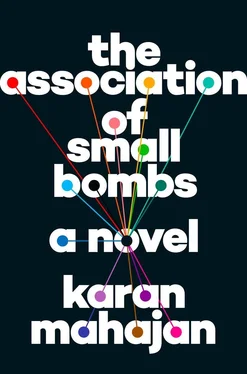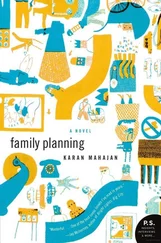It was turning out to be a hideous October, an October of dengue and death, and the waiting grew longer and Ayub’s days as a guest stretched on. He was only allowed to contact Tauqeer through a cybercafe using a new Hotmail account every time, but he was given no answer beyond: wait.
“How long is your friend staying?” Sharif asked Mansoor one day.
Mansoor snapped, “How does it matter?”
________
Ayub visited many parts of Delhi, did all the sightseeing he’d never bothered with before, and wondered if this waiting too was a kind of test — to see if he would give up and go to the police. Certainly he’d had a lot of time to consider what he was doing — and he’d come to the very reasonable conclusion it was indefensible, and that Delhi would respond to a bomb the way it responded to everything: with indifference. He saw the point now of a large attack like 9/11. It guaranteed you were taken seriously. It made sure death wasn’t wasted, as Tauqeer had implied. But what would a big attack, a 9/11, look like in this city? As he contemplated these ideas in Mansoor’s house in South Ex, he felt he was losing his mind, splitting in two, the difference between his polite exterior self and the violence inside growing too great. He felt an actual line passing through the center of his face, splitting it into left and right.
“My job search has still not yielded anything,” he said for the millionth time after coming home from a day of sightseeing.
“Maybe I can help you,” Sharif said one day over dinner, in a rare moment of relaxation. He had just put his fingers in his mouth to cleanse them of the last bits of food and was leaning back heavily in his chair. “What kind of job would you like?”
As Ayub answered, Sharif said, “Arre, Mansoor should have told me earlier — you should work for me.” Sharif ran a consulting business out of an office in Zakir Nagar; he was a plastics engineer and helped companies set up manufacturing and packaging plants in the country.
Ayub had wondered, more than once, why he’d been embedded so conspicuously in an alien family, where his inertia and lack of direction would be instantly noticed, where he was, in a sense, already under trial, being studied by Mansoor’s parents, not just as an individual but as a specimen of their son’s interests — it is through the osmotic medium of their children’s friends, after all, that parents accidentally learn the most about their own children. And now he’d been noticed to the point of awkwardness. Being offered a job was a kind of ultimatum. “No, no, uncle — you should get someone more qualified,” he sputtered.
When he looked at Mansoor for help across the table, Mansoor smiled back encouragingly, his eyes kind under the dense eyebrows.
“It’s this kind of attitude that’s preventing you from finding a job,” Sharif said, thumping him on his back and revealing his large hollow-looking teeth in a smile.
“Thank you, uncle,” he said. But hadn’t Mansoor told him the business was suffering?
________
“I have to leave,” he thought later, when he was back in the den. Tauqeer and co. have sent me here, tricked me into staying for weeks with the promise of an attack, and now I’m going to jeopardize my friend and his family’s position even further by becoming his father’s employee.
That night, from the cybercafe in South Extension, he wrote another e-mail to his comrades — aware, as he typed, of the strangeness of sneaking out to write e-mails (he had told Mansoor he was going out to buy cigarettes) when he could easily write them from his friend’s fancy Pentium, which Mansoor used mostly to surf Islamic message boards. “It’s funny,” Mansoor had said before he’d left. “It makes sense that Islam would benefit so much from the Internet. In a way, Islam was an early form of the Internet — egalitarian, allowing anyone of any class and race to connect to anyone else, breaking down traditional hierarchies.”
“But what about the role of pornography?” Ayub had asked, unable, as usual, to put the full force of his mind into the conversation.
Mansoor continued. “I know that that’s why the Internet was probably started and where all the technological leaps happened. I’ve read this book, Reefer Madness ; it was written by the same chap who wrote Fast Food Nation —have you read it? I think you’d like it. Anyway, in this book, he talks about the porn industry, but the point is—” How the tables have turned! Mansoor thought. Just a few months ago I was being lectured by this confident, self-contained, self-possessed sandy-haired pink-lipped hero and now I’m lecturing him ! Though he didn’t see it that way; he felt only that Ayub was one of those people in his life who brought out the best in him, a rock around which conversation could smoothly bend and flow — a sympathetic ear. So he went on about porn, Islam, and the battle between the two for the pneumatic soul of the Internet.
“I don’t feel right taking the job,” Ayub said at the end of this conversation. “I’ve put your father in an awkward position. And also I know you’re in financial duress.”
“He needs a person he can trust,” Mansoor said. “Actually he’s been asking me to work with him, but he’s too bad-tempered and I fight back. That’s the only thing I would warn you about. Consider it short term. You should look for another job. When you mix friendship and business, sometimes both can go sour.”
It was with these thoughts raging in his head that Ayub wrote Tauqeer an impassioned e-mail from the cybercafe.
________
Two more days passed. Nothing. No reply. Should I go to the police? Are they trying to frame me? he wondered. Finally, disobeying orders, refusing the job, he left the Ahmeds’ residence in South Extension and went to stay in a cheap hotel in Daryaganj.
“He’s a very nice boy, your friend Ayub, very well mannered, well brought up,” Afsheen finally said — as if his niceness was more apparent when he was gone.
“Yaah, very decent chap,” Sharif said.
“I told you, you shouldn’t have offered him a job,” Mansoor said. “He’s too self-respecting.”
“That’s why he doesn’t have a job,” Sharif said. “This, let me tell you, is a problem with so many young Muslims. There’s discrimination, yes; it’s a fact of life — but at the same time there’s a lot of arrogance. Sometimes it’s better to start from a low place and then win trust and work your way up. Instead someone like your friend Ayub, he rejects things preemptively—” That word! Mansoor thought. How it had entered the lexicon! “Then he complains about this country.” That was Sharif’s proud side emerging — he was proud of having made it in a hostile environment.
“But it is very difficult to be constantly rejected,” Mansoor said. “You build a wall around yourself. Sometimes it’s a wall of arrogance.”
“Maybe, maybe,” Sharif said, not listening.
“Razia!” Afsheen said, calling the servant. “Bring the food.”
________
Cast out from Delhi, fleeing Azamgarh, rejected from bourgeois society, severed from the terrorist group — this is how Ayub felt in his hotel room with rats running up and down the corridor and drunk men in lungis lying near the entrance and making fun of whoever passed. Why is this my fate? Or is this too a sort of test? It occurred to Ayub that he had never really been alone — he always ran from one thing to the next. To be alone meant being alone with your thoughts, your consequences, your actions — it meant letting danger wash against your feet and holding steady on the beach of time even as the waves sucked the sand from under your toes. In the sordid room, centuries away from the palatial “den,” Ayub thought of that wonderful feeling of being on a beach, with the earth sliding and emptying beneath you, the soles of your feet caked with black cement-like sand. How he had loved the openness of the ocean the one time he had been to Bombay! It had rained the day before, so the ocean was overfull and boiling, but the sun came out and the beach, with its coconut and pav and chickpea vendors, steamed, and all of Bombay was ripe and bright as it sat around the ocean in a semicircle — he felt he could look through windows kilometers away. Such a shattering vista he’d never seen — the ocean bunched up and tilting and delivering boats toward the shore. He sweated profusely. He was a vain man and he was worried about whether his spray-on deodorant was working. Tara, at his side, made tracks on the beach with her clawlike feet. She had a waddling, confident way of walking. He loved putting his head in the cleft between her neck and shoulder and taking in her flat clean smell. They did touristy things — drinking sharifa milk shakes at the Haji Ali Juice Centre and then walking at low tide, past the curled-up medieval beggars, the touts selling religious books and trinkets, to the religious dome of Haji Ali. The path was slippery, beaten by waves. The shrine, like everything else, was under construction, wrapped in the fresh skeleton of a scaffolding, while behind it, on the low black wet rocks, people sat running their hands through the seawater.
Читать дальше












